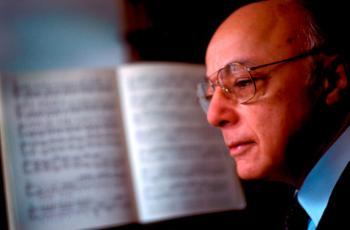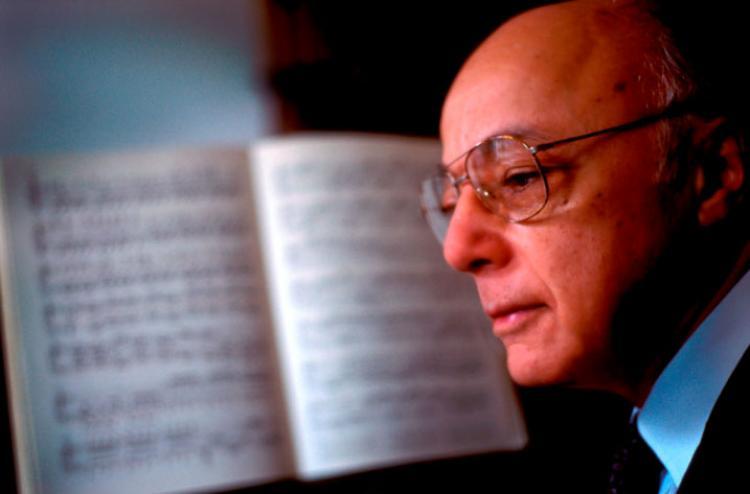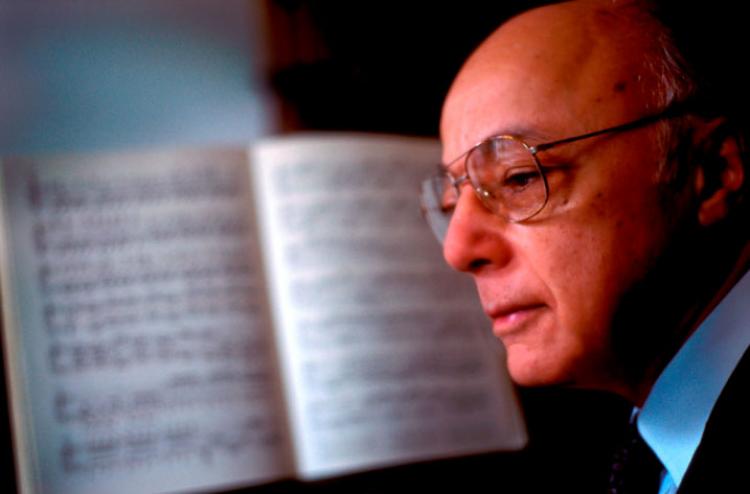Bach, Mozart, Beethoven—these timeless master composers have shaken the world of music not only with their symphonies and sonatas but also with their distinctive styles and personalities.
Numerous contemporary maestros from all over the world dedicate themselves to not only becoming proficient on the notes and scales of these composers, but also to recaptureing the feeling and conveying the meaning of the music.
Renowned concert pianist Seymour Lipkin is one such virtuoso, having recorded the complete 32 sonatas of Beethoven, which were chosen as one of the 10 best of 2004 by the Boston Globe. He is currently working on the complete Schubert sonatas.
Lipkin, who began playing piano at age 3, is the artistic director of the Kneisel Hall Chamber Music Festival. He is on the faculties of both the Juilliard School and the Curtis Institute of Music.
He said that while these great composers are very varied, all three “had the kind of genius for condensing into a small space the musical factors which will convey the emotion directly, immediately.”
“What I think these composers had in common, what makes a great composer, is the ability to crystallize human emotions and to create structures that will convey directly human emotions.”
Each also had his own very unique character. German composer and organist Johann Sebastian Bach (1685-1750) had strong feelings about religion and the world. He was very involved in the Lutheran church, with the result that spiritual elements and emotions are present in his music.
“When Bach writes about the sufferings of Christ, for instance, he felt very deeply,” said Lipkin. “It is very moving because he felt it so deeply and even if we’re not Lutherans or even Christians, we still feel that with him—the depth of his feeling about that.”
While Bach’s compositions are full of power, the music of Wolfgang Amadeus Mozart (1756-1791) is infused with grace. Mozart composed during a different time from Bach—a period when elegance was most valued in society. He was exposed to music almost at birth, and under his father’s influence, he started to compose short pieces even before the age of seven.
Lipkin said Mozart expressed the utmost joy, elegance, and sometimes even great sadness in his more than 600 known compositions. However, Mozart’s sadness was unlike that of Bach’s—it was always “filtered.” Plus, he made jokes.
“Mozart made jokes all the time and you could just see that he had a mercurial personality,” said Lipkin. “There would be a glimmer of sadness, and then he would be happy again … like quicksilver.”
Mozart was also efficient in conveying his feelings without any waste of notes. Lipkin described Mozart’s mind as “going a million miles a minute.”
“He didn’t waste a 16th note … So that you don’t sit there and say ‘Oh this part is not interesting’. Mozart wouldn’t have allowed that. Every moment is full of life and full of interest.”
Like Mozart, German composer Ludwig Van Beethoven (1770-1827) seemed destined to shine in classical music. And like Mozart, Beethoven was introduced to music by his father very early in life.
Young Beethoven met Mozart at age sixteen in Vienna and had the opportunity to hear him play. Their time together was short, but Mozart recognized Beethoven’s genius. After giving Beethoven a piece to play, Mozart left the room and said to his friends, “Pay attention to him; he will make a noise in the world some day or another.”
Although their eras overlapped a little, the world of Beethoven was revolutionary.
“Beethoven was very much involved with the kind of culture that produced the French Revolution and he was a very, very powerful with almost angry personality,” said Lipkin. “There isn’t a moment that isn’t full of surprises or powerful impulse. … Beethoven tried to create large, great structures, and he did. In fact, he created such powerful works that many composers in the 19th century were scared to death of him.”
Beethoven’s strong personality also scared many people into respecting him, as he could “insult people and they took it.” Everyone of his time knew about his great skills.
“He always tried to find some new ways to expand the possibilities of music, always in the most succinct and powerful ways.”
Beethoven’s music, like Mozart’s, did not waste anything. However, Beethoven’s pieces were very long.
“Actually most of the piano pieces are long and you never think of it, because they’re so good, so amusing, so full of life, that it seems like it goes by fast,” he said.
In modern times, each pianist interprets and responds in a different way to these gifted composers, and therefore each performance of the same piece is distinct.
Even within the same performer, one can adjust one’s understanding of the composer and the particular piece as time elapses. Lipkin decided to rerecord two of his Schubert sonatas over the initial recording three years ago, because he felt his understanding of the piece had improved.
Lipkin indicated that a good performance is directly related to the performer’s understanding of the composer’s personality and feeling at the time of composition.
“You have to become that composer, and not a piano player. You are representing that person and that composer. … You can play as fast and as clean and brilliant and everything, but if you don’t put yourself in the skin of the composer, you’re useless.”







